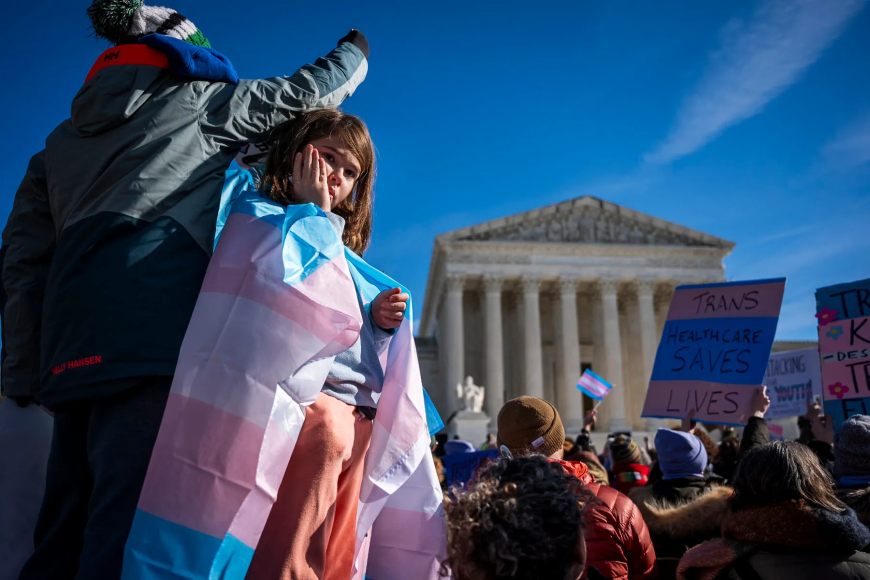U.S. High Court Upholds Tennessee Trans Youth Ban; Appeals Court Backs Washington Protections
In a landmark ruling, the U.S. Supreme Court upheld Tennessee’s ban on gender‑affirming care for transgender minors. Meanwhile, a federal appeals court in Washington dismissed challenges to legal protections that allow trans youth to access care confidentially.

On June 18, 2025, the U.S. Supreme Court, in United States v. Skrmetti, ruled 6–3 to uphold Tennessee Senate Bill 1, confirming that a state law banning puberty blockers and hormone therapy for transgender minors does not violate the Constitution’s Equal Protection Clause GLAAD+15Reuters+15Them+15The Times of India+2Them+2State Court Report+2SCOTUSblog+10Wikipedia+10New York Post+10. Just weeks later, on July 25, the 9th U.S. Circuit Court of Appeals dismissed a constitutional challenge to Washington state laws protecting transgender minors’ rights—specifically those safeguarding access to health care and shelter without mandatory parental notification Facebook+3Reuters+3Reddit+3. Together, these rulings underscore a national legal divide over transgender youth health care and rights.
Supreme Court Decision Keeps Tennessee Ban Intact
The Case: United States v. Skrmetti
Tennessee’s Senate Bill 1 (2023) bars medical providers from prescribing puberty blockers or hormone therapy to minors seeking gender-affirming care—except in cases like congenital anomalies or precocious puberty Wikipedia. The law was challenged by transgender teens, their families, and a Memphis physician citing violations under the 14th Amendment’s Equal Protection Clause Wikipedia+15Reuters+15The Guardian+15.
Majority Opinion
Chief Justice John Roberts, writing for the conservative majority, determined the law did not violate equal protection. The Court concluded it classifies on age and medical use, not sex or transgender status, thus only requiring rational basis scrutiny—a deferential standard Tennessee Lookout+8Reuters+8Reuters+8.
Dissenting Viewpoint
Justice Sonia Sotomayor, joined by Justices Kagan and Jackson, sharply disagreed—arguing the law imposes sex-based discrimination in practice and fails to account for transgender youth’s medical needs. She warned the decision leaves young people vulnerable to political whims and undermines judicial responsibility The Guardian+1New York Post+1.
Broader Implications
With similar laws enacted in 26 states, this ruling potentially clears the way for broader enforcement and sustains state-level autonomy in regulating transgender youth care. Legal experts note that while this decision is a setback for LGBTQ+ advocates, it leaves open future challenges over parental rights or adult care restrictions Wikipedia+15Reuters+15The Times of India+15.
Washington State Rulings Affirm Trans Rights Protections
In contrast, the 9th Circuit Court on July 25, 2025 rejected attempts by anti-trans organizations and parents to overturn adult and youth rights provisions in Washington state. The plaintiff groups claimed the laws infringed parental prerogatives and free speech—but the court found they lacked legal standing due to no concrete harm presented Reddit+3Advocate.com+3Reuters+3.
What Was Challenged?
The laws at issue allow transgender minors—particularly runaway or at-risk youth—to access gender-affirming and reproductive health services, and shelter care, without parental notification when abuse or neglect is a concern San Francisco Chronicle+1Reuters+1.
Court Rationale
The appeals court ruled unanimously that the plaintiffs could not demonstrate tangible injury, and the statutes do not impede parental authority or free speech rights. The protections remain intact, safeguarding youth autonomy in sensitive circumstances San Francisco ChronicleAdvocate.com.
Comparison: Diverging Legal Landscapes
| Jurisdiction | Legal Outcome | Impact on Trans Youth |
|---|---|---|
| Tennessee | Ban upheld by SCOTUS | Limits access to puberty blockers/hormones, sexual-identity medical care restricted |
| Washington | Laws upheld by 9th Circuit | Protects youth access to care and shelter, recognizes confidentiality in abuse situations |
The juxtaposition illustrates contrasting legal and political landscapes: while Tennessee’s law curtails gender-affirming care, Washington’s protections reinforce youth-centered rights and medical autonomy.
Humanitarian Response & Medical Consensus
Major medical organizations including the American Medical Association, American Psychological Association, Endocrine Society, and World Professional Association for Transgender Health (WPATH) have unequivocally supported access to gender-affirming care for youth, citing evidence of its positive effect in reducing depression and suicidal ideation The Guardian+4GLAAD+4The Times of India+4Tennessee Lookout+2Reuters+2The Guardian+2Wikipedia+1AP News+1.
LGBTQ+ advocacy groups, including the Tennessee Equality Project, condemned the Supreme Court’s decision and expressed concern over state-level political encroachment into medical decision-making Tennessee LookoutThe GuardianGLAAD.
Legal and Political Fallout
Following the Skrmetti ruling, transgender youth advocates anticipate increased legal moves to safeguard rights in Democratic-led states. In Washington and other states with LGBTQ+-friendly policies, protective statutes are expected to endure, although further legal appeals are possible Reuters+15Them+15HRC+15.
The contrasting rulings highlight the patchwork nature of U.S. transgender law, where healthcare access for minors now depends on geographic and political context.
Continuing Legal Battles
While the Supreme Court affirmed state authority, it avoided broader determinations on whether transgender individuals qualify as a protected class—leaving this question unresolved. This opens a window for future cases based on due process, parental rights, and adult care policies Reuters.
Legal advocates remain poised to challenge similar bans, using federal and state constitutional arguments or medical necessity defenses. Even in states with bans, some courts have issued temporary injunctions, allowing continued care pending litigation results.
Conclusion
The U.S. Supreme Court’s decision in United States v. Skrmetti marks a pivotal moment in transgender rights jurisprudence, one that empowers states to restrict gender-affirming care for minors under a deferential legal standard. At the same time, the Washington appeals court ruling underscores how some states continue to uphold protective statutes—affirming youth autonomy in healthcare access when parental involvement is not safe.
For transgender youth and families, the legal terrain remains deeply fragmented—defined increasingly by state borders. Future court rulings, legislative sessions, and advocacy campaigns will determine whether access becomes more uniform or further diverges across the nation.




















































